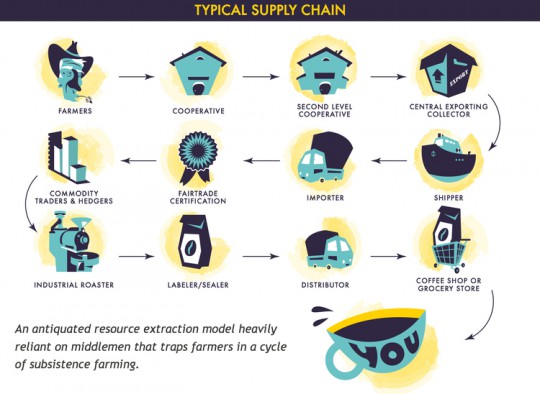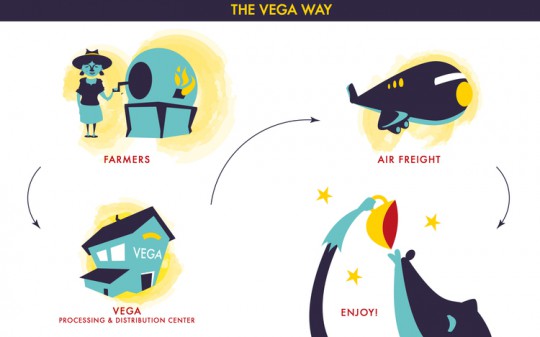A few months ago, the Fairtrade movement came under fire after a British study stated that fairtrade certified farmers were actually making less and were working in worse conditions than non-certified farmers. Of course, this was not the first time the fairtrade movement was accused of failing to fulfill its goals. However, Vega, a new company based in León, Nicaragua has decided to employ a new method of business that focuses much more on the coffee farmers. They see the problem with fairtrade products in a bloated supply chain; this is the normal supply chain for a cup of fairtrade coffee:
Each small scale farmer produces about 500 pounds of Fair Trade organic coffee a year and gets around $1.30 a pound, or $700 a year. The upshot: Farmers of specialty grade coffee beans earn $1 a pound for a product costing U .S. consumers maybe $20.
It’s important to keep in mind, fairtrade certification groups are not crooks and are not necessarily trying to dupe American consumers or coffee growers; they’re doing what they think is best to help the farmers. Vega founders, Noushin Ketabi, Rob Terenzi, and Will Deluca, believe that they can eliminate most of the players in this complicated sequence. From Forbes:
Vega’s aim is to cut out most of those other players. To that end, it would set up a processing, packaging and distribution center located 20 to 30 minutes from farmers. There the coffee would be loaded in pallets, shipped overseas via a U.S. carrier, then broken down and mailed to consumers. Farmers would be paid when the processing is done, so it’s not contingent on supply and demand fluctuations. The founders are still working out the details, but, ”We’ll match the Fair Trade price and pay for the value of the processing on top of that,” says Ketabi. The result would allow farmers to earn up to four times what they typically receive.
The plan also is to train the first group of farmers in how to do the roasting using special equipment designed by Vega and engineers at a local NGO that uses 90% less fuel than the usual roaster, according to Ketabi. Then that first wave would train the next group.
The online site will allow consumers to drill down and get all sorts of information about the product, searching, for example, for a region or even specific farmers. Customers can curate the coffee themselves, receiving two eight-ounce bags a month, or leave that to Vega, since two of its founders also are certified coffee roasters.
Hopefully soon, Vega will launch on online marketplace where consumers can select and order coffee directly from the growers. Their new model would look like this:
Right now, the group is in a “pre-pilot phase.” The founders hope to start a pilot in Nicaragua and start the operation on a small scale. To get started on their work, Vega launched a Kickstarter campaign earlier today. Check out Vega’s website to learn more about the people involved andtheir reasons for starting this organization.
Concerned individuals have been worried about poverty alleviation for coffee growers for years, hence the fairtrade movement was born, and now if Vega can raise the revenue and the three founders can pursue their dreams, they may change the supply chain of fairtrade products and help the poorest coffee growers worldwide.



